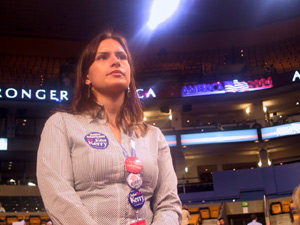Audio
Photos
Your Voice
| |||||||||||||||||||||||||||||||||
Pro-choice Catholics in Democratic delegation feel the heat
July 29, 2004
Sen. John Kerry is just the third Catholic ever nominated to be president of the United States. In 1928, Al Smith, and again in 1960, Sen. John F. Kennedy -- both Democrats -- had to answer questions from voters about the role of their religion in governing. Now, some politicians are answering the same question, but this time it's coming from their church.
Boston, Mass. — Last month, the U.S. Conference of Catholic Bishops approved a task force report that said bishops have the right to deny communion to Catholic politicians who support abortion rights. In Minnesota, according to the Minnesota Catholic Conference, no Catholic has been denied communion because of those beliefs.
But some Catholic members of the Minnesota delegation to the Democratic National Convention in Boston, say the report has put pressure on them to choose between their faith and their politics.
"I was raised Ojibwe, Irish, Catholic, and a DFLer, none of which is more important than the other," says Peggy Flanagan, 25, of Minneapolis, a member of the White Earth Band of Ojibwe.
 | |||
Flanagan, is the only native American member of the Minnesota delegation. But she's not the only Catholic. According to a survey of delegates by the Associated Press, the 28 Catholics in the 98-member delegation make up one of the largest contingents of Catholics in recent Minnesota delegations.
Flanagan, who's a candidate for the school board in Minneapolis, thinks Catholic Democrats are assuming a larger political role as a reaction to the emergence of the the power of Catholic Republicans -- and the bishops -- in political fights over abortion and same-sex marriage.
"It was difficult, and it is difficult, that the church in which I grew up, is now sort of rejecting folks, whereas when you get to the door of the church, when you walk through those doors, that's between you and God," she says.
Flanagan was not denied communion, but she said she no longer felt welcomed in her parish. So she recently switched congregations and attends a Lutheran church, even though she still considers herself a Catholic.
But does the Catholic Church consider her a Catholic? While saying that bishops have the right to deny communion to politicians, the letter said individual Catholics need to decide on their own whether they're worthy of receiving communion.
In Winona, Bishop Bernard Harrington, who could not be reached to comment on this story, wrote that Catholics who support legalized abortion, "should not come forward."
That suggestion puts Nora Slawik, a DFL state representative from Maplewood, in a tough spot.
"My daughter is going to be getting communion, wearing the beautiful white dress and going to the classes, and I want her to be proud of getting communion. and it's almost the ultimate juxtaposition to be a politician and to be struggling with the church and having your child going through that sacrament," says Slawik.
Both Slawik and Flanagan think the bishops' task force report was aimed directly at Democrat John Kerry, a Catholic and a supporter of legalized abortion. Some conservatives in the church say Kerry isn't Catholic enough, at least on this issue. That stands in contrast to 1960, when the knock against another Massachusetts senator running for president -- and the last Catholic nominated by the Democratic Party -- was that he would take his orders from the Vatican.
While the question of the sacraments is of concern to the Catholic politicians, the effect on the races in November is being calculated by political operatives of all stripes. According to Luis Lugo, the director of the non-partisan Pew Forum on Religion and Public Life, the Catholic vote is a swing vote. About 25 percent of the 2000 presidential vote was Catholic, and Catholics make up a large part of the population in Florida, Pennsylvania, Michigan, Ohio, and Minnesota, all key states in the November election.
"This is a vitally important issue for white evangelicals, conservative Roman Catholics, so my prediction would be that particularly on the Republican side, that this is an issue that they're going to press extremely hard to rally those constituencies to go out and vote for the re-election of President Bush," according to Lugo.
Only a handful of bishops have taken the position that they would deny communion to Catholic public officials who dissent on the abortion issue. And the bishops letter in June cautioned against misusing religion for political ends.
Rep. Slawik said her priest has told her he will not deny her communion, but he said some in the church want her excommunicated, and she worries about what will happen if a parishioner blocks her from receiving communion.
The benediction at the Democratic National Convention was given by a Catholic priest picked by John Kerry. The Rev. John Ardis opposes abortion, and says "neither the Democrats nor the Republicans are fully in step with Catholic teachings." And in his benediction, Ardis referred to the abortion issue.
The U.S. Conference of Catholic Bishops says it will not issue a definitive directive to priests on providing communion to pro-life politicians until November -- after the election.
|
News Headlines
|
Related Subjects
|


